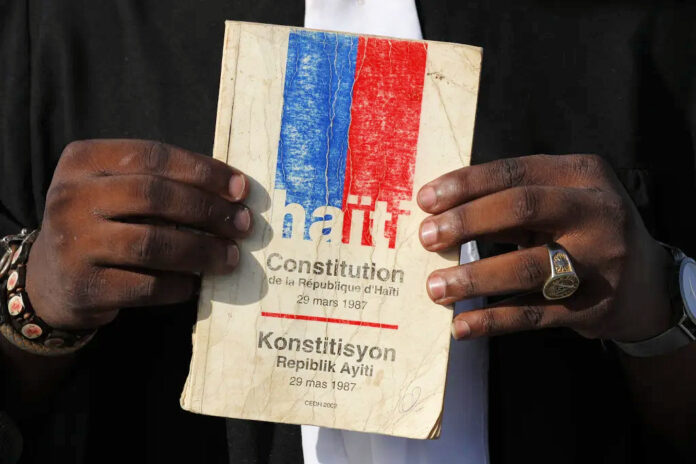
Haiti’s draft constitution, submitted on May 21 to the Transitional Presidential Council (CPT) by the Steering Committee of the National Conference, is facing intense backlash from the population, particularly political actors, civil society leaders, economists, and legal scholars. Critics contend that the document not only proposes broad changes that would restructure the Haitian state but also risks exacerbating the country’s governance crisis and igniting new territorial and political divisions.
The debate comes amid one of Haiti’s most destabilizing eras in recent history—marked by spiraling gang violence, institutional collapse, and a crisis of democratic legitimacy. Haiti has not held national elections since 2016 and governance has relied on provisional mechanisms since the 2021 assassination of President Jovenel Moïse. The draft constitution is the latest in a long line of attempts to impose structural change without the democratic consensus many say is necessary for legitimacy.
Sweeping proposals trigger alarms over fragmentation and power concentration
Among the most controversial proposals: the elimination of local managerial structures — Communal Section Administrative Council (CASEC) and the Assembly of the Communal Section (ASEC) — the introduction of elected departmental governors with no oversight from the central administration, the consolidation of executive power under the president — who would also serve as head of government — and the exclusion of Haitians with dual nationality from holding key public offices.
“If validated, this text would render Haiti tragically ungovernable and completely sideline the diaspora,” warned Jerry Tardieu, former parliamentarian and coordinator of the Constitutional Working Group (GTC). He said the proposal’s structure and language bear “glaring inconsistencies” and a philosophy “contrary to national consultations.”
Under Article 68-2 of the draft, governors would be elected for five-year terms with unlimited re-election. Economist Jeffsky Poincy called the move a “recipe for chaos” in a post on X, warning it would deepen fiscal and territorial inequalities.
Financial analyst Ralph Ganthier said the new structure would turn each governor into a “king,” further fragmenting national governance.
Ganthier argues that those who proposed the governor position fail to understand its historical and institutional implications. According to him, this reform creates an executive power without checks and balances, as it lacks mechanisms for parliamentary or judicial oversight.
“It makes him a king,” Ganthier wrote on his X account. “So, since we all agree that we cannot govern a small territory of 27,750 km², we have decided to split it into tiny fragments.”
the new structure would turn each governor into a “king,” further fragmenting national governance.
Currently, each department is governed by a three-member council, known as the Departmental Council (CD, per its French acronym), which is elected for a four-year term, as per Article 78 of the 1987 Constitution. However, the draft constitution, in Article 68-2, proposes replacing this structure with a governor elected by universal suffrage for a five-year term, with the option for indefinite re-election.
Le Nouvelliste editor-in-chief Frantz Duval likened the plan to a regression into pre-independence “caciquats” that divide the nation at its weakest moment. “The draft legitimizes armed leaders who now rule seized territories,” he wrote in an editorial.
Duval reminds Le Nouvelliste readers that the last time the island nation was ruled by multiple leaders was in 1492, when Christopher Columbus arrived. He also points out that the last governor of the French-controlled part of the island was Toussaint Louverture, during a time when independence wasn’t even considered.
Economist Eddy Labossière also criticized the foreign-inspired model, calling for a constitution that addresses local realities like corruption, inequality, and weak public institutions.
Shrinking Parliament, expanding presidential control
The draft reduces each department’s Senate delegation from three senators to two and restructures the lower chamber— the Chamber of Deputies— by redefining arrondissements as electoral districts. Parliamentary checks on the executive branch are largely erased: the president appoints ministers and a prime minister without parliamentary approval.
Constitutional law professor Sonet Saint-Louis called the change “absolute presidentialism,” saying it turns the prime minister into a “mere executor” and drastically weakens institutional balance.
For the first time, the diaspora would be allowed to elect two senators. However, Haitians with dual nationality would still be barred from holding numerous high-level offices — such as minister, senator, judge, or director of the anti-corruption unit ULCC — repeating a long-standing grievance of Haitians abroad.
“This contradicts even the previous proposal under Jovenel Moïse, which at least opened more doors for the diaspora,” said legal expert Windy Phèle.
The judiciary is still politically dependent, magistrates warn
Judicial independence is also under threat, legal experts say. The proposed lifetime appointments for Cassation Court judges, as stipulated in Article 15, and the continued presidential power over judicial nominations are particularly controversial.
Members of the Association des Professionnels Magistrats (APM) and the National Association of Haitian Magistrates (ANAMAH) warned that the lack of term limits and CSPJ [Superior Council of the Judiciary] oversight undermines judicial integrity. “The judiciary remains a political tool,” Judge Martel Jean Claude said.
Phèle criticized the lack of consultation with judicial associations in shaping the draft. “A constitution that disregards the input of those most affected risks failing to meet the standards of balanced and fair governance,” the Ph.D holder in criminal law added.
Historical echoes of instability
Haiti has seen more than 20 constitutions since its independence in 1804. The current 1987 Constitution, created in the wake of Jean-Claude Duvalier’s dictatorship, was intended to decentralize power and build democratic institutions. Yet multiple revisions since then have reflected political maneuvering rather than national consensus.
The 2025 draft of a new constitution is the latest in this lineage of contested overhauls. Rather than uniting the country, experts warn, it could accelerate its disintegration.
“Our consultations made it clear that Haiti must be unified,” said Tardieu. “This proposal fragments the Republic, thrusts it into a maze of competing powers, and opens the door to chaos.”
This article is republished from The Haitian Times, where it first appeared.









